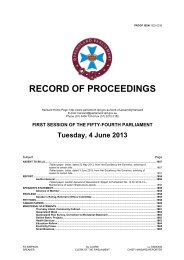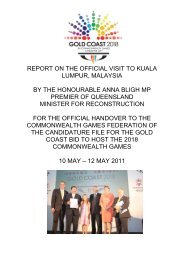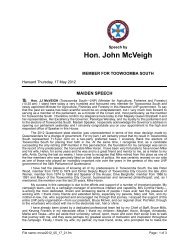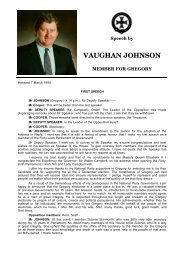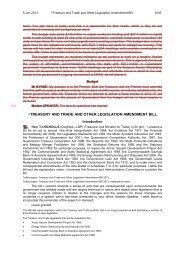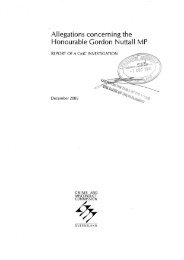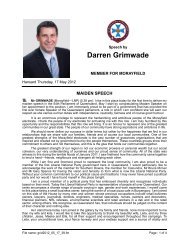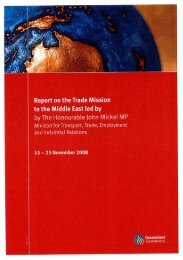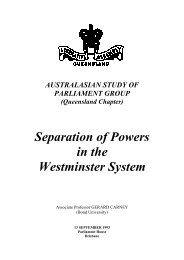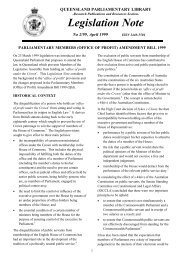weekly hansard - Queensland Parliament - Queensland Government
weekly hansard - Queensland Parliament - Queensland Government
weekly hansard - Queensland Parliament - Queensland Government
You also want an ePaper? Increase the reach of your titles
YUMPU automatically turns print PDFs into web optimized ePapers that Google loves.
2596 <strong>Queensland</strong> Competition Authority Amendment Bill 23 Aug 2005<br />
misgivings when the QCA is given more power and more authority. A little township called Mount<br />
Larcom in my electorate had a water pricing issue. The QCA reviewed the Gladstone Area Water Board<br />
for the second time in two years, although those reviews were supposed to be undertaken only on a<br />
five-yearly cycle. In that review the QCA recommended that Mount Larcom consumers pay something<br />
like $8 a kilolitre for water. That was an increase of over 1,000 per cent per kilolitre of water that was<br />
currently supplied. There appeared to be no public benefit test applied and the decision was made<br />
purely on an economic basis, that is, the cost of the line and the rate of return that was appropriate,<br />
according to the QCA, for the Gladstone Area Water Board.<br />
At the time the Calliope council raised a concern about the way in which the QCA reached its<br />
conclusions and asked for clarification of the basis on which its decision was made. To my knowledge<br />
that information still has not been forthcoming from the QCA. The QCA appeared not to have taken into<br />
account an historical agreement with Cement Australia about the company carrying the operation and<br />
maintenance costs of the line where water is taken off for Mount Larcom. Certainly, there was no<br />
consideration given of the ability of that community to pay the exorbitant price that was to be the ceiling.<br />
I also found the QCA unaccountable in that process. It put forward this recommendation of a<br />
ceiling price. The Mount Larcom community was devastated. Most people said, ‘We won’t be able to<br />
afford to pay for water. We’ll have to go off line. We won’t be able to sell our properties because no-one<br />
else will buy them because the cost of water is so high. The QCA has effectively left us with nowhere to<br />
go.’ The QCA then reviewed its figures and the increase was something like the increases in the CPI<br />
plus the current costs. But in the interim, there had been months of concern and heightened distress by<br />
residents who lived there, a public meeting and a great deal of publicity. The QCA refused to send a<br />
representative to the public meeting to explain its process. The QCA sent a letter which effectively<br />
blamed everyone else but the QCA. So I express concern when the QCA is given additional power, as<br />
this legislation proposes.<br />
As the member for Ipswich said, there are three elements to this legislation to ensure that the<br />
legislative provisions in the <strong>Queensland</strong> Competition Authority Act are workable and enforceable<br />
against access providers where those access providers are not the owners of the declared facility. The<br />
example that has been used is Dalrymple Bay. Certainly, if a private entity has leasehold power over a<br />
strategic piece of infrastructure such as a port, it should be subjected to the same rules, requirements,<br />
obligations and constraints that a government entity would have to work through and work with.<br />
The second element allows the <strong>Queensland</strong> Competition Authority to undertake an additional<br />
monitoring and/or dispute resolution role for government business voluntary codes of conduct. Although<br />
that will apply to some of the major infrastructure for government business—and I looked at local<br />
government infrastructure to see where it might apply—it may apply to regional landfills and the like<br />
where the QCA will have some powers.<br />
It is the third element that I would seek the Premier’s advice on: to allow the QCA to share<br />
relevant confidential information with the state departmental coregulators for electricity, rail and water<br />
without the regulated entities’ consent. My concern is that it could establish a situation where openhanded<br />
communication could be put at risk. The explanatory notes state—<br />
The Act does not allow the QCA to disclose commercially-confidential information to another person without the provider’s<br />
consent, except in those circumstances where the recipient of this information is a Minister, a QCA member or an entity that<br />
performs similar functions to the QCA ‘under a law of the Commonwealth, another State or a foreign country.’<br />
They go on to state—<br />
The amendments will allow the QCA to share confidential information, relating to the State’s regulated rail, energy and water<br />
entities, with the relevant departmental co-regulator (namely, the Directors-General of Transport, Energy and Natural Resources<br />
and Mines, respectively) without the need for first obtaining the relevant regulated entity’s consent.<br />
Is that the extent of the power, that it allows for confidential information sharing between QCA, the<br />
shareholding minister and the departmental directors-general? How far through that organisation will it<br />
allow confidential information to be transported? I ask this because confidential information could<br />
include the price, the terms of a contract, whether the contract has been subject to a dispute, the nature<br />
of the dispute and information in relation to the dispute resolution or lack of resolution. I would be<br />
interested to know how that information will be contained within the departments, whether those same<br />
confidentiality obligations will apply to the directors-general and, if the Premier says later that it will be<br />
extended to other office holders, whether confidentiality will apply to them.<br />
I would also be interested to know whether the Premier sees this as undermining the open<br />
communication that, I believe, currently exists between most entities and their shareholding<br />
departments. It is my understanding that there is a free flow of information between, for example, QR<br />
and the transport department and area water boards and the Department of Natural Resources and<br />
Mines. I expect that there would be a free flow of information. If there have been problems, I would be<br />
interested to know the types of problems that have been encountered. But, in particular, I would like to<br />
know the breadth of that information—how far through the departments the information will go. Will it just<br />
go to the minister and the director-general or will it go to other office holders within those respective<br />
shareholding portfolios? I look forward to the Premier’s response.



